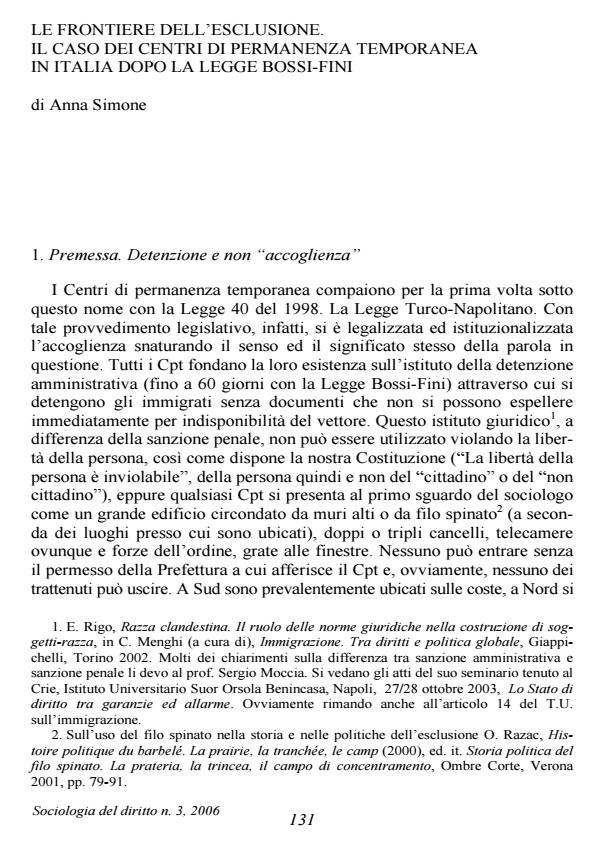Le frontiere dell'esclusione. Il caso dei centri di permanenza temporanea in Italia dopo la legge Bossi-Fini
Journal title SOCIOLOGIA DEL DIRITTO
Author/s Anna Simone
Publishing Year 2007 Issue 2006/3
Language Italian Pages 8 P. 131-138 File size 40 KB
DOI
DOI is like a bar code for intellectual property: to have more infomation
click here
Below, you can see the article first page
If you want to buy this article in PDF format, you can do it, following the instructions to buy download credits

FrancoAngeli is member of Publishers International Linking Association, Inc (PILA), a not-for-profit association which run the CrossRef service enabling links to and from online scholarly content.
Italy’s temporary holding centres constitute a sort of black hole for the law. Established to detain migrants pending their expulsion from Italian and European Union soil, they shot into the news headlines and the socio-political and legal debate because, in addition to institutionalising reception, they have drained all meaning from one of the most important articles in the Italian Constitution (The freedom of the individual is inviolable). This is because migrants are detained for up to sixty days in these temporary holding centres by virtue of the Bossi-Fini Act solely because of having taken the step of migrating, which under normal circumstances should not constitute a crime. There is such scanty literature about this topic that the only way to achieve an understanding of its sociological nature is to make a comparative study of other models of detention, such as the open prison, the closed prison or closed institutions. This method of analysis immediately shifts the focus to the types of society that establish forms of custody of these kinds. It therefore follows that the contemporary societies that establish temporary holding centres to contain and manage migratory flows seem to be obsessed by the risk and by an almost pathological need for security which, however, only makes itself felt with regard to certain types of social actors. These actors are stigmatised and considered to be socially dangerous or liable to become so merely because they have no fixed position in society and in the working world. The dynamics of contemporary societies therefore tend to construct black-and-white mindsets (citizen v. non-citizen, legal v. illegal etc.) which, as such, produce new forms of exclusion, as well as an evident “dual regime” in law. As a result, temporary holding centres become the paradigmatic space of a society shaped by a world outside and another world of the internees, the latter regularly managed by a staff dedicated to what goes by the name of humanitarial work: a society shaped by a real, happy and productive world and by a world populated by discarded lives.
Anna Simone, Le frontiere dell'esclusione. Il caso dei centri di permanenza temporanea in Italia dopo la legge Bossi-Fini in "SOCIOLOGIA DEL DIRITTO " 3/2006, pp 131-138, DOI: